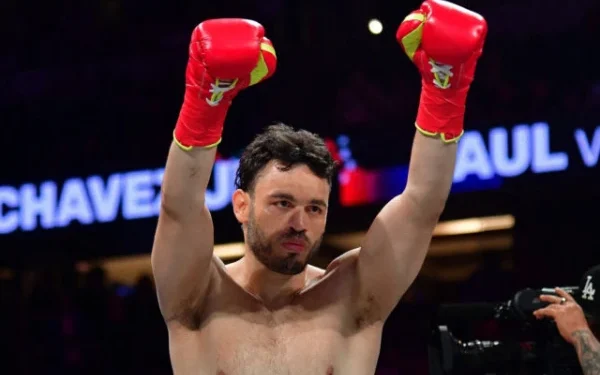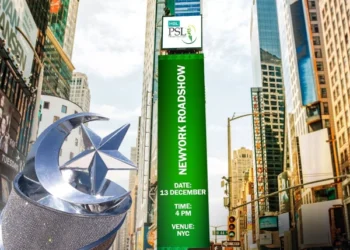LOS ANGELES – In a dramatic turn of events, U.S. immigration authorities have arrested Julio Cesar Chavez Jr., a former middleweight boxing world champion and son of legendary Mexican boxer Julio Cesar Chavez Sr. The arrest occurred in the Studio City area of Los Angeles, just days after Chavez Jr.’s high-profile defeat in the ring against YouTuber-turned-boxer Jake Paul in Anaheim, California.
The U.S. Department of Homeland Security (DHS) issued a statement confirming the arrest, citing an active arrest warrant in Mexico. Chavez Jr. is accused of serious criminal offenses, including alleged ties to organized crime, trafficking of illegal weapons, ammunition, and explosives. DHS officials have stated that he is being held in immigration custody pending his imminent deportation to Mexico, where he will face legal proceedings.
Arrest Details and Immigration Status
Julio Cesar Chavez Jr., 39, was taken into custody during an early morning raid in Studio City, a suburban neighborhood in the San Fernando Valley region of Los Angeles. DHS agents, acting on intelligence shared between U.S. and Mexican authorities, moved swiftly to detain the boxer on grounds of violating U.S. immigration laws and over concerns related to public safety.
According to DHS, Chavez Jr. overstayed his tourist visa, which had expired in February 2024. Despite his pending application for U.S. citizenship through marriage to an American citizen, the boxer is accused of providing false information to immigration officials regarding his past and present associations.
Links to Organized Crime and the Sinaloa Cartel
The most serious allegations against Chavez Jr. involve his purported connections to Mexico’s powerful and dangerous Sinaloa Cartel, a transnational criminal organization known for its involvement in drug trafficking, arms smuggling, and violence across the Americas. DHS sources allege that Chavez Jr. has had direct dealings with cartel members and has participated in the trafficking of assault-style weapons and explosives between the U.S. and Mexico.
U.S. authorities claim that his wife was previously in a relationship with one of the sons of Joaquín “El Chapo” Guzmán, the notorious former leader of the Sinaloa Cartel who is currently serving a life sentence in a U.S. federal prison. While Chavez Jr.’s own connections remain under investigation, these personal associations have intensified scrutiny over his activities and immigration status.
A DHS spokesperson emphasized that the current administration is maintaining a hardline stance against criminal elements, regardless of fame or influence. “Under President Trump’s leadership, the law is equal for everyone—even the most famous athlete in the world,” the statement read, invoking the administration’s focus on strong immigration enforcement and national security.
Previous Legal Troubles in the United States
This is not the first time Chavez Jr. has found himself in legal trouble on U.S. soil. In 2023, a warrant was issued for his arrest by a California judge in connection with an arms trafficking investigation. The following year, in 2024, he was convicted for illegal possession of an assault-style weapon—a violation of California’s strict gun control laws.
Despite these convictions, Chavez Jr. managed to remain in the U.S. while pursuing his boxing career and applying for citizenship. Critics have pointed to this as a failure of immigration enforcement and judicial coordination, while his legal team argues that he was unfairly targeted due to his celebrity status and Mexican heritage.
Boxing Career in Decline
Once hailed as a rising star in the boxing world, Chavez Jr.’s career has seen a steady decline in recent years. A former WBC middleweight champion, he was once considered a potential heir to his father’s legendary status in the sport. However, a combination of inconsistent performances, substance abuse issues, and legal troubles have derailed his athletic trajectory.
His recent bout against social media influencer Jake Paul served as a stark reminder of how far his career has fallen. Despite his pedigree and years of professional experience, Chavez Jr. was decisively defeated by Paul in Anaheim. The loss raised questions about his fitness, training discipline, and future in boxing.
Family Legacy Overshadowed
Julio Cesar Chavez Sr., the boxer’s father, is considered one of the greatest fighters in boxing history and a national hero in Mexico. The elder Chavez enjoyed a storied career, winning multiple world titles in three different weight classes and retiring with an impressive record. His legacy, however, has been clouded by his son’s ongoing troubles.
In past interviews, Chavez Sr. has spoken candidly about his son’s struggles with addiction and legal problems. He has urged him to focus on rehabilitation and personal growth, but those efforts now appear to have been eclipsed by more serious allegations.
Legal Response and Community Reactions
Chavez Jr.’s lawyer has categorically denied all allegations, calling the arrest a political stunt aimed at intimidating the Latino community and tarnishing the name of a high-profile Mexican athlete. “This is another sensationalized case to strike fear into immigrants and portray Mexicans as criminals,” the lawyer stated.
Latino advocacy groups have expressed concern over the timing and handling of the arrest, arguing that it plays into harmful stereotypes and may discourage cooperation between immigrant communities and law enforcement.
However, others in the legal community argue that the evidence against Chavez Jr. is serious and that he must face due process in both the United States and Mexico. If deported, he will likely be handed over to Mexican federal authorities who are expected to reopen a long-standing investigation into his ties with organized crime.
What Comes Next for Chavez Jr.?
Julio Cesar Chavez Jr. remains in immigration custody and is expected to appear before an immigration judge within the coming days. While deportation is considered imminent, his legal team may seek to delay or block the move by filing emergency appeals or requesting asylum protections.
Experts note, however, that due to the gravity of the allegations and his prior criminal convictions, Chavez Jr. faces an uphill battle. Once returned to Mexico, he will likely be detained and questioned by Mexico’s Attorney General’s Office (FGR), which has long been investigating cartel-related financial and weapons networks.
Conclusion
The arrest of Julio Cesar Chavez Jr. marks a significant moment not just in the life of a troubled athlete, but in the broader conversation surrounding immigration enforcement, celebrity accountability, and transnational crime. While the former champion once carried the weight of his father’s name into the ring, he now faces the possibility of a different legacy—one entangled in scandal, legal peril, and alleged ties to one of the world’s most dangerous criminal organizations.
As the legal proceedings unfold, the sports world, law enforcement agencies, and immigrant communities alike will be watching closely to see what lies ahead for the disgraced former boxing star.

























